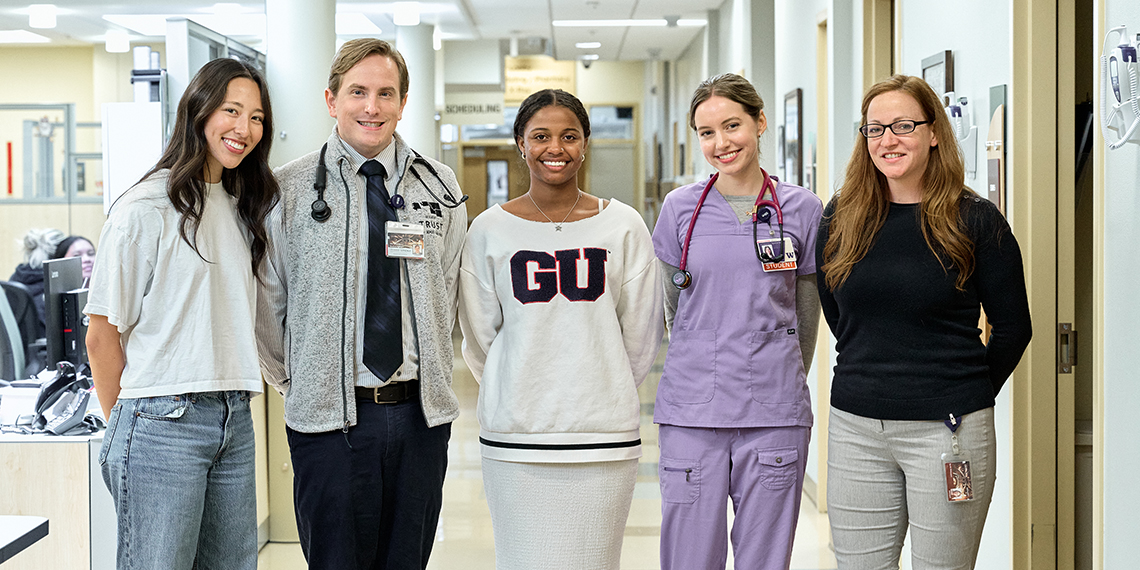ŌĆ£This is SomebodyŌĆÖs Real LifeŌĆØ
Student research brings focus to rural health needs

If you hop on Highway 2 and head west from Spokane for about 80 miles, through golden wheat fields, along rocky cliffsides and finally winding down toward the Columbia River, you’ll find yourself in Grand Coulee.
It’s a little less than a two-hour drive from Spokane, but the landscape, the population size, and, most importantly, the access to health care, could not be more different.
“If I wake up sick in Spokane,” says Kendall Scipio-Shepherd (’26), “I just know I’m going to Sacred Heart or Deaconess and they’re going to give me what I need, and I’m going to be fine. But it’s not that way in Grand Coulee. A patient could be dealing with a chronic condition and travel a good distance to reach a rural clinic and they can only hope to receive the treatment they need.”
Scipio-Shepherd is one of two students researching alongside Professor Sarah Matousek this summer at the Coulee Medical Center. Matousek is an assistant professor of public health at ═°▒¼├┼ and teaches at the University of Washington School of Medicine’s campus in Spokane, one of several joint faculty with the UW-GU Health Partnership. She’s helped Scipio-Shepherd and Emma Swenson (’27) embark on their first research project starting in spring 2025 and continuing through the summer.

“Where I’m from in Seattle, public health really isn’t a priority," Scipio-Shepherd says. “But I didn’t know that until I learned what public health really means.” It's made up of what she calls “the little things” like safe sidewalks, clean drinking water, parks and good schools. Things that, when put together, don’t really seem so little. She sees public health as an opportunity to help her community in the long run.
“I like that you can help a large group of people from behind the scenes,” Swenson says. “It’s doing things that people don’t often notice, but that are super important.” Another take on the little things not being so little.
Their research centers on a similar idea – looking at whether chronic physical illness and mental illness are linked, and if one worsens the other, specifically in a rural community like Grand Coulee. The goal is to identify patterns in patient needs and explore possible solutions.
So, every week this summer, Swenson and Scipio-Shepherd made the 80-mile drive from Spokane to Grand Coulee for a few important reasons.
“The first is, well, to use the hospital’s Wi-Fi,” laughs Swenson, “because the program we’re using for research is doesn’t work as well away from the hospital.” The program they use allows them to review Coulee Medical Center’s patient list and compare it to other medical records to identify any similarities or discrepancies with other patients. As part of their research, Scipio-Shepherd and Swenson were granted special access to patient records to pull information and document it in a secure, HIPAA-compliant database that de-identifies the data.
But what exactly are they looking for?
“Social determinants, how many medications a patient is coming in with and how many they leave with, how long they’ve stayed at the hospital and if they’re readmitted within 30 days,” just to name a few, says Scipio-Shepherd. Once they have all this information, they look to see how it differs from patient to patient, specifically, between people who have mental health illnesses as well as chronic illnesses, versus people with chronic illnesses but not mental illness.
While this is ongoing research, Swenson says they’ve already been able to pick up on some patterns. “We’ve had a couple of people who have mental health illnesses and chronic illnesses and they stayed three days longer at the hospital than the average person does,” she says.
The second reason they took their research on the road was the opportunity to work with two UW-GU Health Partnership students: Lydia Larson and Alex Wilmoth. Larson and Wilmoth are both medical students in UW’s Targeted Rural and Underserved Track (TRUST) program. They’re fulfilling their clinical rotations at the Coulee Medical Center and have been able to answer questions for Scipio-Shepherd and Swenson and mentor them throughout their research. The entire project is made possible thanks to the generosity of Dean and Vicki Allen who funded the McKinstry Fellowship, a program designed specifically to bring together UW and GU students.

And, finally, perhaps the most important reason to venture to Grand Coulee each week – to be immersed in the environment and be near the people they could potentially help.
“We’ve done the reading and the research,” Scipio-Shepherd says, “But once you’re actually working with data from real people and seeing that it’s affecting real lives, it’s different. It makes you tune in a bit more because you know you’re actually helping someone and could make their conditions better.”
She never expected that from the research experience.
“This is a really unique opportunity for undergraduate students,” Swenson agrees, “because we’re learning about this in class, we’re learning research methods. But it’s interesting to put all that together and see how it actually applies and synthesizes in real time.”
“We jumped into this not really knowing what we were doing,” she laughs. Even Professor Matousek nods in playful agreement. “But I feel like both of our learning and growth has increased exponentially just by being here and doing it.”
They both credit Matousek for being an integral part of their research experience, saying they wouldn’t be in the position to make these big realizations without her.
There might not be beakers or goggles, but when they open someone’s medical records, searching for an answer to their problems, Scipio-Shepherd says she’s struck with a powerful thought: “This is somebody’s real life, and I could really change it.”
- Academics
- Health & Wellness
- School of Health Sciences




